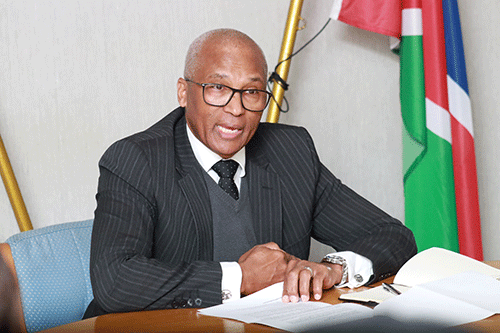Bad luck comes in threes is an adage that sums up the perfect storm that engulfs embattled rail carrier TransNamib.
TransNamib board chairperson Lionel Matthews and his lieutenant Sigrid Tjijorokisa abruptly resigned as company directors this week.
Matthews’ purported refusal to disclose contents of a report forced Tjijorokisa to quit.
She resigned on Wednesday as 80% of the TransNamib workforce simultaneously downed tools, demanding better wages and improved working conditions.
At the heart of the storm is the Ernst and Young (EY) forensic report into alleged corruption and abuse of office at the broke entity.
Transport minister John Mutorwa is copied into Tjijorokisa’s letter to his finance counterpart, Iipumbu Shiimi.
The investigation into alleged maleficence at TransNamib was sanctioned by erstwhile public enterprises minister Leon Jooste last year, during Tjijorokisa’s reign as chairperson.
The public enterprises ministry now exists as a department within the finance ministry.
“It is my firm view that a board that governs whilst being aware of material irregularities by senior executives is not a board,” the lawyer asserts.
Tjijorokisa is also pained over the extension of CEO Johny Smith’s employment contract for a further five years, pending the outcome of the investigation.
“I am of the view that in the context of all the material irregularities brought to the fore and the current performance and employee climate of the company, that this decision is not only unacceptable, but also grossly negligent and irresponsible,” she stated.
Oversight
Her efforts to right the wrongs at the parastatal were seemingly met with resistance from those benefiting from TransNamib’s demise.
Tjijorokisa also fails to understand why she has been kept in the dark about the loans TransNamib secured from the development banks of Namibia and Southern Africa.
“As a director, I can be held personally and criminally accountable if information which may have induced this financial institution to exercise its discretion in a certain way was withheld,” she told Shiimi.
Without pulling punches, she said: “It is regrettable that such a strategic national asset is being compromised. The total lack of accountability, governance and transparency by the board and the department of public enterprises is regrettable.”
She then goes on to incriminate the TransNamib board.
“I am of the view the board is no longer acting in the best interests of this organisation, nor are the directors exercising their fiduciary obligations. I can no longer associate myself with this without becoming complicit,” she charged.
“I am willing to reconsider this position, provided that the current board is removed and a new board is appointed that embraces proper governance principles.”
Shiimi’s public enterprises executive director Ndiitah Nghipondoka-Robiati and Tjijorokisa were unreachable on their mobile phones.
TransNamib’s spokesperson Abigail Raubenheimer declined to be caught in crossfire, saying the company cannot pronounce itself on board-related matters.
Reputation
Despite promising to overturn the fortunes of an entity on the brink of collapse two weeks ago, Matthews also resigned on Wednesday.
“There is a continued demand to remove the current CEO and some executives by the union, based on an EY report that still is not finalised,” he said, adding that the spat between Tjijorokisa and Smith is an open secret.
“The deputy chair is of the view that the board is compromised to decide to renew the contract of the CEO for another five years, a view that I disagree with,” the chartered accountant said.
His reputation is at stake, he said in the missive, also seen by this paper.
He then accused Tjijorokisa of dragging the board members through the mud.
“I will not allow my reputation and my character to be drawn into question by the union in public,” he stated.
He added that he can also not account for the quagmire at the rail company, as he only joined the board in February.
“Where TransNamib is, is not my doing. It is the mismanagement that happened by those who came before me,” Matthews reiterated.
Mecca
A fortnight ago, Matthews sang from a different hymnbook. He was apparently going to transform TransNamib into a mecca of excellence.
“We will embark on monthly operational board meetings from now until March 2023 to work with the management as a short-term oversight to change the trajectory of operational, customer service and financial outcomes in a positive manner,” he had said.
His optimism was pinned on the green hydrogen project, oil finds, and several mines that will start operations.
At the time, he said, the rail entity was well-positioned to benefit from the logistics opportunities which would accrue from these enterprises.
Contacted yesterday, the seasoned executive was tight-lipped: “No comment,” came the curt response.
Derailed
The cash-strapped entity is trying to remain afloat, and currently loses N$10 million every month.
On top of this, the leaked forensic report lays bare a myriad of irregularities at the rail entity – ranging from ineffective and inadequate utility costs to dodgy contracts.
The auditors also found that “incompetent executives” are rewarded handsomely at the bedridden entity.
The executives were also paid performance bonuses, despite the absence of a performance management system.



